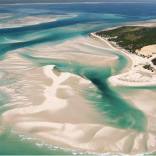Mozambique: Dane Kondic must perform his duties at LAM "on an exclusive basis" - LAM
Mozambique: Tourism sector – Digital platforms to pay taxes

FILE - For illustration purposes only. [File photo: Southeast international]
International digital platforms offering tourism services in Mozambique may soon be required to pay taxes to the Mozambican state for transactions related to tourist establishments operating in the country. These platforms, which earn commissions on such services, currently do so without being taxed.
Businesses affected include companies specializing in travel bookings that generate revenue
by acting as intermediaries in the tourism sector. No mechanisms currently exist to enable
tax authorities to collect revenue from this segment.
In response, a draft law has been prepared and will be submitted for approval in the next legislative session. This initiative aims to formalize taxation and incorporate these operations into Mozambique’s fiscal administration framework.
The information was shared with Notícias by Amorim Ambasse, director of the Digital Economy Taxation Unit at the Mozambican Tax Authority (AT), in an interview where he discussed the initiative to regulate online tourism transactions.
This measure targets earnings by foreign digital platforms like Booking, Trivago, and others
that facilitate accommodation in Mozambique.
“When we make a reservation and pay the corresponding amount outside the country, these platforms earn commissions. Although they are not physically present in Mozambique, revenue generated within national territory is expected to be taxed based on the commissions earned,” Ambasse emphasized.
This initiative is part of the broader effort to tax the digital economy, a segment that is becoming increasingly significant globally, including in Mozambique.
The AT has been identifying ways to regulate and tax internet-based commercial activities, keeping pace with technological and economic advancements.
Additionally, some tourist establishments and services in Mozambique continue to process their revenues abroad. However, the proposed law does not eliminate the obligation to repatriate revenue generated overseas, which must occur within 15 days after the tourist’s
departure.
Meanwhile, tourism establishments in the country are being registered in the Tourism
Management System, overseen by the National Tourism Institute (INATUR), as stipulated by
Decree No. 74/2022 of December 30.












Leave a Reply
Be the First to Comment!
You must be logged in to post a comment.
You must be logged in to post a comment.